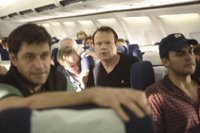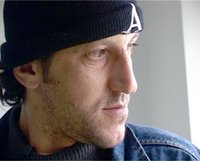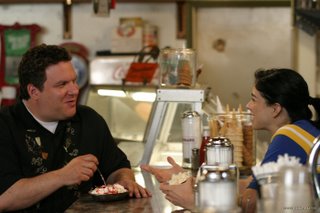Well, Tribeca is over. I didn’t see any of the award winners, unfortunately.
The Free Will, the Jonestown doc,
Maquilapolis: City of Factories,
loudQUIETloud (Pixies doc) , and
The War Tapes were among those I meant to see, but just didn’t get to. I agree with
Filmbrain about the size of the festival. If they showed half as many films, it would still be massive, and they could focus more on the quality of the films they present, weeding out some of the less interesting stuff. I only saw twelve films (cheating to include
MI:3 and
United 93, which I did not actually see as part of the fest), but two of those really had no business being in a major festival. If there are about 300 really good feature films out there right now, waiting to be shown, Tribeca either couldn’t get them, or made the wrong choices.
If they’d given me a fancier press pass, I would

have been able to see more, but because I wasn’t guaranteed seating to any of the public screenings, I stuck mainly to the press screenings, and tried to choose the stuff I thought would interest me, based on subject matter, clips (if they were available online) and the creative people involved (which means mostly whether or not Sarah Silverman was in them).
Thankfully, I saw what I have to believe was the most important film of the festival, and certainly the best I saw. You know, that expertly made docudrama about the “real cost” of 9/11.
What?
United 93? You’re joking, right?
No, I’m talking about
The Road to Guantanamo.
My Tribeca was all about make-believe. We had:
-John Malkovich pretending to be Kubrick,
-Sabina Guzzanti pretending to be Berlusconi,
-Reed Fish pretending to be Zackary Adler, who pretended to show us a movie, when it was really a movie within a movie,
-Jeff Garlin pretending that no one would notice him pretending to be Larry David
-Keith Fulton and Louis Pepe doing a very good job of pretending that their
Brothers of the Head was a documentary about the Bang Bang, a conjoined twins fronted 1970s rock band,
-Perry Grebin and Michael Nigro doing a somewhat poorer job of pretending that their purported documentary,
American Cannibal, was a sly commentary on our national obsession with reality TV, and not just a cynical attempt to exploit that obsession.
-The US government pretending that three innocent British men were best buddies with Osama bin Laden and Mohammad Atta,
-Tom Cruise pretending to be Philip Seymour Hoffman,
-JJ Abrams pretending that it will take extremely complicated plot by a rogue agent to get us into another war in the Mideast,
-Paul Greengrass pretending that a well-executed partial simulation of the events of the morning of 9/11 is somehow important or useful.
United 93 was a gut-wrenching experience, as they say, and I found its real-time depiction of

the nuts and bolts aspect of air traffic control and military decision-making on that morning fairly fascinating. Seeing it in real time is not the same as reading about it, and I did find myself wandering off and thinking about seven minutes of My Pet Goat, for some reason. So it was useful to me, in that limited sense. When it’s focus is on the actual plane and its passengers, it seems more like docudrama bullshit to me. Clearly, Greengrass knows that we will never know what those passengers said to each other or did on that morning. His solution is to avoid showing anyone saying or doing much of anything that might indicate that they had any type of individual personality. This might be respectful, but it’s certainly not insightful, and, unlike the earlier scenes in the control towers, it doesn’t really capture what was so irrevocably horrible about that day. Which is not to say that I wanted to relive those feelings I had, sitting up here with Lisa in what was then, thankfully, our apartment (by which I mean to say, I am glad that neither of us was alone that morning) watching the TV, horrified about all those people, and wondering what would become of our city and our world. But this film brought those feelings back to me with an immediacy that I did not expect. Which is not to say that a less capable filmmaker couldn’t have done the same damn thing, which is why I guess some people think of
United 93 as exploitation, despite its virtues. And I have mixed feelings about it, but I guess I am leaning toward agreeing with them. The real time element makes the nuts-and-bolts element, which you could read about in a multitude of newspaper and magazine articles, more immediate, but the film's emotional impact--the trauma it evokes--is not justified by the information it imparts. Since the film doesn't put these events in the context of what's happened since, the sorrow and anger it brings up are not useful emotions.
The Road to Guantanamo inspires feelings just as powerful, but it is a much more "important" and "useful" film, providing a very detailed and convincing look at one aspect of our country's ongoing efforts to produce more terrorists. I think the film is great, and I want everyone to see it. I'm astounded that Michael Winterbottom can go from making
Tristram Shandy to this, and can do both things so brilliantly. This is as good a time as any, I guess to plug earlier films of his, like
Wonderland and
I Want You, that you might have missed.
Early on in the film, I wondered about the Tipton Three, because the story they tell (the film is

comprised of interviews with the former prisoners, reenactments, and news footage) of how they ended up in a Taliban stronghold in northern Afghanistan doesn't make much sense. But in the end, there's no evidence of anything other than their being in the wrong place at the wrong time, and evidence used to be the standard that we used before we put people in prison, let alone for years, and let alone while torturing them for information that they clearly did not have eg. "Where's Osama?"
It seems there are fewer and fewer of the Kool-Aid drinkers around these days (unless you look online) so maybe a lot of people will actually get to see this film, and will get an inkling of how far from our ideals our country has strayed.
While those two films both left me in a grim mood, hope was proffered at a screening of Ronit Avni's fine documentary,
Encounter Point. One of the films subjects, Ali Abu Awwad, attended the screening, and spoke afterward. He is a Palestinian whose brother was killed by Israeli soldiers, and who was himself imprisoned for many years, along with other family members. Now a peace activist, Awwad approaches the notion of peace between Palestinians and Israelis from a very pragmatic and practical, as opposed to an idealistic or political point-of-view. He pointed out at the Q&A that communication is key, because peace itself represents

something very different for Palestinians than for Israelis. For most Israelis, it essentially means that they can continue their lives as they have been, without having to worry about suicide bombing, while for Palestinians, it essentially means, as Awwad put it, that "we can begin to live." Selling the notion of statehood and peaceful coexistence to Palestinians is harder, because it's so much further removed from their current existence than it is for Israelis. He explains that many of them have no hope of peace, so their anger becomes destructive. But he and others are out there, talking to both Palestinians and Israelis of all political stripes, trying to shift the focus from the violence that the media obsesses over. And it seems to be working, slowly. He does win people over, and he makes a compelling case that this kind of grassroots activism is the only possible way to affect real change in the region.
I'll post some more about what I saw later today, or tomorrow.
 nonfiction book about a family living in Chicago's notorious Cabrini Green, and being a fan of Bernard Rose's underrated Candyman, which took place at a fictionalized version of Cabrini Green, I had a lot of curiosity about how detailed the film would be in its depiction of project life, and how incisive it would be in confronting the culpability of well-meaning, well-to-do white liberals in the suffering of poor black people.
nonfiction book about a family living in Chicago's notorious Cabrini Green, and being a fan of Bernard Rose's underrated Candyman, which took place at a fictionalized version of Cabrini Green, I had a lot of curiosity about how detailed the film would be in its depiction of project life, and how incisive it would be in confronting the culpability of well-meaning, well-to-do white liberals in the suffering of poor black people.




